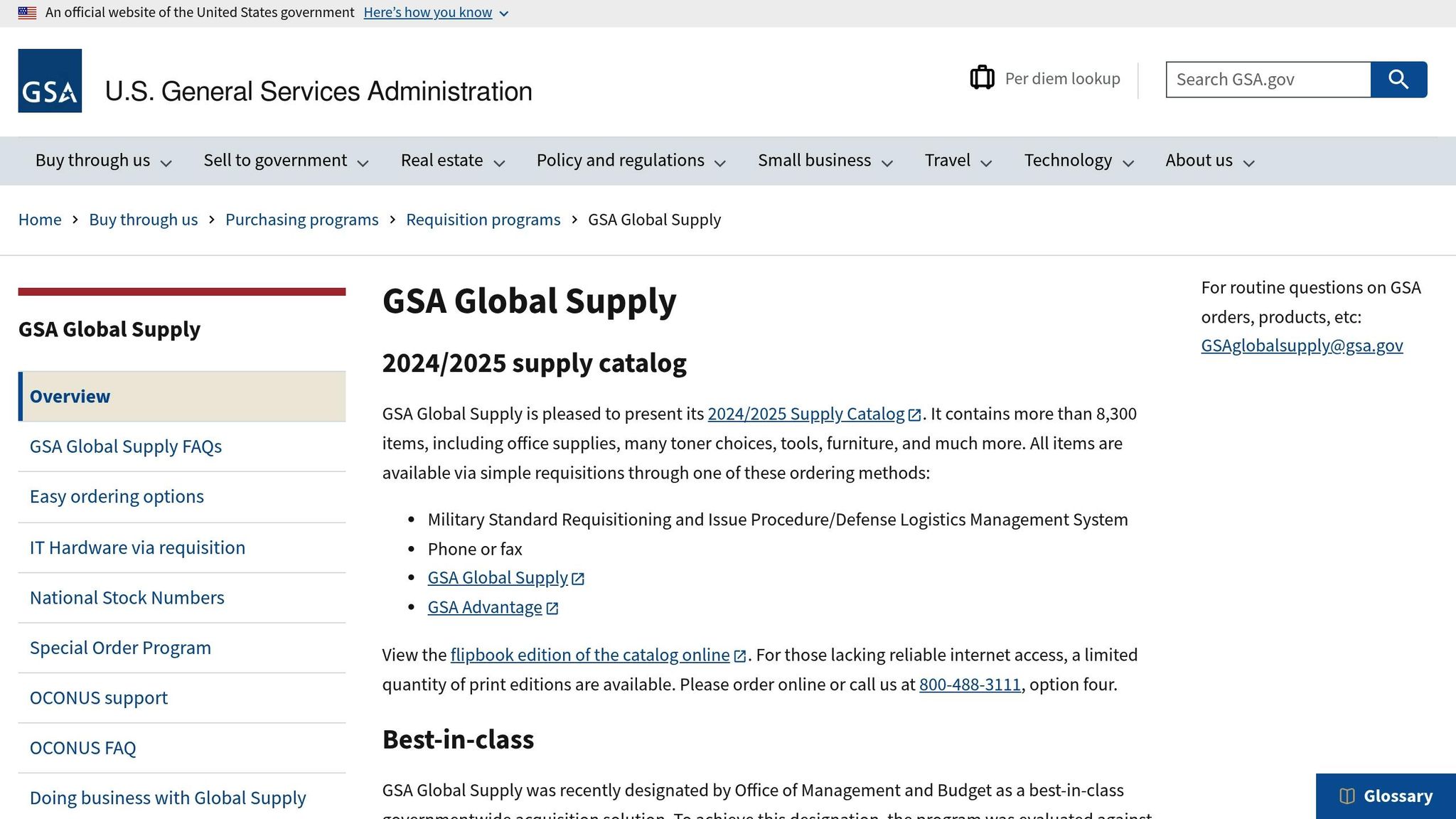GSA contracts simplify government procurement by offering pre-negotiated prices and terms for products and services. They save time and money for federal, state, local, and tribal governments, as well as certain nonprofits. Here’s what you need to know:
- Who Can Use GSA Contracts?
- Federal Agencies: Primary users benefiting from streamlined procurement.
- State and Local Governments: Eligible through programs like Cooperative Purchasing, Disaster Purchasing, and the 1122 Program.
- Tribal Governments: Access via specific federal funding authorities.
- Nonprofits: Includes organizations like the American Red Cross and some educational institutions.
- How to Use GSA Contracts?
- Platforms like GSA Advantage, eBuy, and GSA Global Supply make purchasing easy.
- Follow procurement rules, negotiate discounts, and document transactions to ensure compliance.
- Why Use GSA Contracts?
- Reduce lead times by up to 40%.
- Access over 11 million products and services.
- Ensure fair pricing and trusted vendors.
Start using GSA Advantage to simplify your purchasing process and maximize efficiency.
GSA Schedule Basics Part 1
Who Can Use a GSA Contract?
Understanding who qualifies to use a GSA contract is key to unlocking its full potential for procurement. The General Services Administration (GSA) serves the purchasing needs of federal, tribal, state, and local governments, as well as certain nonprofits, provided they meet specific program requirements.
The GSA handles about 21% of federal procurement, which translates to approximately $42 billion annually. Through the Multiple Award Schedule (MAS), state and local governments gain access to over 11 million commercial products and services at discounted rates.
However, eligibility alone doesn’t guarantee product availability or the right to transfer purchases to third parties. Resale purchases are also off-limits unless explicitly authorized. To maintain access, all entities must comply with GSA program guidelines and related authority requirements.
Let’s break down the eligibility criteria for federal agencies, state and local governments, tribal governments, and nonprofits.
Federal Agencies
Federal agencies are the primary users of GSA contracts. These contracts simplify the procurement process by eliminating the need for individual negotiations. Federal buyers benefit from pre-negotiated terms and competitive pricing, making it easier to fulfill their purchasing needs efficiently.
State and Local Governments
State and local governments can tap into three specific programs: Cooperative Purchasing, Disaster Purchasing, and the 1122 Program. Eligible entities include state, county, city, and town governments, as well as tribal or territorial governments operating outside self-governance compacts or self-determination contracts. Organizations established by state law, such as local educational institutions, colleges, and universities, also qualify.
- Cooperative Purchasing: This program allows for the purchase of IT, security, and law enforcement solutions. It gives state and local entities access to federal contract terms for technology and security needs.
- Disaster Purchasing: Designed for acquiring goods and services to prepare for or recover from natural or man-made disasters. Purchases are limited to MAS contracts and authorized Blanket Purchase Agreements (BPAs).
- The 1122 Program: Focused on law enforcement, this program enables the purchase of equipment and vehicles for counter-drug efforts, homeland security, and emergency response activities. States must have a certified Single Point of Contact (SPOC) to utilize this program.
State and local governments can also use federal grant funds to procure supplies and services during public health emergencies.
Tribal Governments and Nonprofits
Tribal governments and certain nonprofits are also eligible to use GSA contracts under specific conditions. Tribal entities can leverage federal funding authorities to access GSA resources. For example:
- BIA and BIE: Covered under the Indian Self-Determination and Education Assistance Act and the Tribally Controlled Schools Act.
- HUD: Covered under the Native American Housing Assistance and Self-Determination Act.
- IHS: Covered under various acts, including the Indian Health Care Improvement Act.
Qualified nonprofits include organizations like the American National Red Cross, Gallaudet University, Howard University, and agencies supporting the blind or severely handicapped.
"This list is not all-inclusive; others may also be eligible to use GSA sources of supply and services." – GSA
If there’s any doubt about eligibility, entities can email their documentation to gsaeligibilitydetermination@gsa.gov for clarification.
"Eligible entities can buy goods, services, and solutions, subject to applicable conditions, from GSA sources." – GSA
These eligibility rules ensure that GSA contracts remain a trusted and efficient procurement option for authorized users.
How to Access GSA Purchasing Platforms
If you’re eligible to purchase through GSA contracts, you’ll primarily use three platforms: GSA Advantage, eBuy, and GSA Global Supply. Each platform caters to specific procurement needs, offering tools to simplify the buying process.
- GSA Advantage: This online shopping portal connects buyers to thousands of contractors, offering millions of products and services.
- GSA eBuy: A platform for competitive procurement where buyers can post Requests for Quotation (RFQs) or Requests for Proposals (RFPs) and receive bids.
- GSA Global Supply: Designed for routine purchases, this requisition-based system focuses on items like office supplies and tools.
Using GSA Advantage

GSA Advantage is known for its straightforward interface, making it easy to browse products categorized by Special Item Numbers (SINs). Buyers can check product details such as pricing, delivery terms, and specifications to ensure they meet their needs.
Competitive Bidding with eBuy
GSA eBuy simplifies the competitive bidding process for government buyers. By posting an RFQ or RFP, you can specify requirements, quantities, delivery terms, and assign the correct SIN. Once posted, the system alerts qualified contractors, and RFQs typically stay open for about five days, though this can be adjusted based on your timeline. After the bidding period closes, proposals are reviewed based on criteria like price, quality, delivery terms, technical specs, and past performance. The contract is awarded to the vendor offering the best overall value.
Placing Orders with GSA Global Supply

For routine orders, GSA Global Supply offers access to around 800,000 products, including office supplies and tools. Before placing an order, ensure compliance with GSA SmartPay policies and review mandatory procurement sources outlined in FAR 8.004(a) and 8.004(b). This includes considering AbilityOne agencies, small businesses, and UNICOR for purchases over $3,500. Federal agencies are also encouraged to explore excess personal property options before buying new items.
The Commercial Platforms Program further integrates required sourcing, supply chain risk management, and certifications to streamline the ordering process. For compliance, it’s a good idea to consult FAR 13.2 and 13.301 and check with your agency champion for guidance.
If you’re with the Department of Defense (DoD), additional steps are required for certain shipments. Complete the Material Safety List and ensure hazardous material certifications meet international standards.
sbb-itb-8737801
Best Practices for GSA Contract Buyers
Now that you know how to access GSA purchasing platforms, let’s dive into some best practices that can help you stay compliant while getting the most value out of the process. Buying through GSA contracts isn’t just about convenience – it’s about ensuring every step aligns with federal regulations while making the most of GSA’s pre-negotiated terms.
Getting Fair and Reasonable Pricing
Even though GSA contracts come with pre-negotiated prices, it’s still important to confirm that the pricing meets the standards outlined in FAR 8.405-2(d). Start by issuing a detailed RFQ (Request for Quotation) to Multiple Award Schedule (MAS) contractors. Be clear about the scope, location, duration, deliverables, and performance expectations. While the quoted prices shouldn’t exceed MAS rates, you can and should negotiate for additional discounts where possible.
To cross-check current MAS pricing, use tools like GSA Advantage, buy.gsa.gov, or the eLibrary. If you’re dealing with service contracts, pay close attention to the proposed mix of labor and level of effort. For instance, if a contractor suggests using senior-level staff for routine tasks, it may not provide the best overall value. Always evaluate whether the staffing plan aligns with the complexity of the work.
Meeting Competition Requirements
Adhering to competition requirements is essential for both compliance and securing the best deal. For purchases above the micro-purchase threshold but below the simplified acquisition threshold, you’ll need to get quotes from at least three schedule contractors – or document why competition was limited. For larger orders, competition is mandatory unless you have an approved waiver. As FAR states, "Each order shall be placed on a competitive basis…unless this requirement is waived on the basis of a justification".
One way to ensure fair competition is by using the GSA eBuy system to post RFQs, which allows all schedule contractors to respond. Throughout the process, keep detailed documentation of your solicitation steps. Evaluate contractor responses based on factors like past performance, delivery terms, technical specifications, and any unique features they offer. This thorough approach helps you secure the best overall value for your agency.
Keeping Proper Documentation
Good record-keeping isn’t just a best practice – it’s a requirement. Proper documentation ensures compliance and supports your procurement decisions during audits. Keep clear and concise records of evaluated MAS contracts, purchase details, pricing, and justifications, as outlined in FAR 8.405-1(g), 8.405-2(f), and 8.405-3(a).
Remember, GSA contractors undergo a Contract Assessment by their Industrial Operations Analyst (IOA) at least once every five years. Repeated non-compliance with MAS requirements can lead to contract cancellation. Keeping your records in order not only protects your agency but also streamlines future audits and assessments.
Conclusion: Start Using GSA Advantage
GSA contracts provide access to a wide range of buyers, including federal agencies, state and local governments, tribal entities, and nonprofits. Whether you’re purchasing through Cooperative Purchasing, Disaster Purchasing, or the 1122 program, these pre-negotiated contracts simplify procurement while ensuring compliance and delivering value to taxpayers. With GSA Advantage, this process becomes even more efficient and accessible.
GSA Advantage offers a user-friendly online platform that connects you directly to approved products and vetted contractors. You can search by keywords, national stock numbers, contract numbers, or vendor names, making it easy to compare features, prices, and delivery options. Users frequently praise the platform for its ability to save time and improve efficiency. As one user shared:
"It’s been a game changer as a purchaser. What used to take me hours now takes me minutes." – Current GSA Advantage User
Another user highlighted the financial benefits:
"The prices are fair and allow us to save taxpayers money … I can purchase one item if that is all that is needed." – Current GSA Advantage User
State and local governments enjoy significant cost savings by leveraging federal buying power, while tribal governments benefit from tailored support and federal agencies’ trust obligations. For all eligible buyers, GSA Advantage simplifies the procurement process and ensures access to essential solutions.
Getting started is straightforward: register on GSA Advantage, explore the eLibrary for vendors, and use eBuy to submit RFQs. If you’re using federal grant money, coordinate with funding agencies and ensure compliance with both GSA and your organization’s procurement guidelines.
By combining pre-negotiated pricing, vetted contractors, and seamless electronic ordering, GSA Advantage transforms government procurement. The platform also provides training resources and support through the National Customer Service Center, helping users maximize its benefits.
Explore GSA Advantage today to simplify your procurement process and deliver greater value to taxpayers.
FAQs
What should state and local governments do to stay compliant when using GSA contracts?
State and local governments can successfully navigate compliance with GSA contracts by focusing on a few essential practices:
- Keep registrations current: Ensure your registration on SAM.gov is active and renew it every year to avoid interruptions.
- Adhere to federal rules: Comply with federal equal opportunity employment laws and meet any performance standards specified in the contract.
- Confirm authorized personnel: Double-check that only approved representatives place orders and that every order includes the correct MAS contract number.
- Update certifications: Regularly refresh any required small business certifications to stay in line with contract requirements.
By staying on top of these steps, state and local governments can confidently use GSA contracts while meeting federal compliance standards.
Can nonprofits use GSA contracts, and what do they need to qualify?
Nonprofits can potentially tap into GSA contracts, but not all qualify automatically. The General Services Administration (GSA) has specific criteria that nonprofits must meet to gain access. Typically, eligibility extends to organizations that serve individuals who are blind or severely disabled, along with others granted statutory authority to use GSA resources. Simply holding nonprofit status isn’t enough to guarantee access.
To determine if they qualify, nonprofits may need to submit documentation that outlines their status and mission. For clarity, organizations can directly request an eligibility determination from the GSA. This step ensures they meet the requirements and can access GSA purchasing platforms if eligible.
How can buyers negotiate additional discounts on GSA contract prices?
GSA contract prices are pre-negotiated, but that doesn’t mean you can’t secure extra savings. While the listed GSA price sets a maximum limit, it’s often possible to negotiate for a better deal. This is especially true for larger purchases or recurring orders, where buyers are encouraged to ask for discounts.
To increase your chances of success, compare offers from several contractors to create competition. You can also work directly with the Contracting Officer (CO) to discuss options like volume discounts or other perks tied to your order size or purchasing history. Clear communication and showing the value of your order can go a long way in helping you secure more favorable terms.
Related posts
- Types of Federal Procurement Methods Explained
- How Agencies Use GSA Schedules to Order
- How GSA Advantage Simplifies Federal Buying
- What Is a GSA Contract and Why Should Small Businesses Care?


